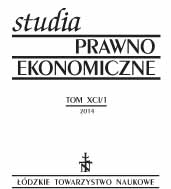Chwalebna rewolucja a struktura prawna Dominium korony angielskiej w Ameryce
The Glorious Revolution and the legal structure of the English Crown Dominion in America
Author(s): Piotr MichalikSubject(s): Law, Constitution, Jurisprudence
Published by: Łódzkie Towarzystwo Naukowe
Keywords: Glorious Revolution; Dominion; American colonies; Lords of Trade; Board of Trade
Summary/Abstract: According to the “ancient constitution” of the Kingdom of England, the overseas dominions fully belonged to the king’s prerogative (dominium regale). For that reason, the legal structure of the seventeenth century American colonies was shaped independently by the Crown. The first Stuarts limited themselves only to establish the legal frames of the private colonies, making them nearly sovereign entities. In order to strengthen the navigation system, introduced by the republican government (1651), Charles II created the base for the centralized royal Dominion in America. Subsequent Crown’s endeavors managed by the Committee of Privy Council for Trade and Plantations (Lords of Trade), which was organized in 1675, brought to the settlement of James’s II Dominion of New England (1686–89). This process was suddenly broken by the events of the Glorious Revolution of 1688/89, which led to the fall of the Dominion of New England and significantly diminished the Crown oversight of the colonies. As far as this paper is concerned, in opposition to the situation in England, the constitutional effects of the Glorious Revolution in America were not longstanding. Because the victorious Parliament was aware mainly for maintenance of the navigation system, the colonies were left under the king’s prerogative. Owing to that, in 1696 William III nominated royal Commissioners for Trade and Plantations (Board of Trade) to govern the overseas dominions. In that way, Parliament consented for the exclusion of the American colonists from the privileges guaranteed by the new constitutional rules. Such a policy occurred to be the cause for their future mutiny, which led to the fall of the First British Empire.
Journal: Studia Prawno-Ekonomiczne
- Issue Year: 2014
- Issue No: 91/1
- Page Range: 103-122
- Page Count: 20
- Language: Polish

